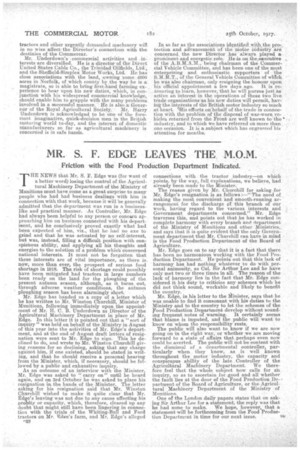MR. S. F. EDGE LEAVES THE M.O.M.
Page 4

If you've noticed an error in this article please click here to report it so we can fix it.
Friction with the Food Production Department Indicated.
IRE NEWS that Mr. S. F. Edge was (for want of a better word) losing the control of the Agricul tural Machinery Department-of the Ministry of Munitions must have come as a great surprise to many people who had had business dealings with him in connection with that work, because it will be generally admitted that the department was run in a businesslike and practical manner. As Controller, Mr. Edge had always been helpful to any person or concern appioaching him on business connected with his department, and he conclusively proved exactly what had been expected of him, viz., that he had no axe to grind and that he was actuated by no self-interest, but was, instead, filling a difficult position with conspicuous ability, and applying all his thoughts and energies to the solution of a problem which concerned national interests. It must not be forgotten that these interests are of vital importance, as there is now, more than ever, the prospect of serious food shortage in 19181 The risk of shortage could possibly have been mitigated had tractors in large numbers been ready on the land for the plauOing of the present autumn season, although, as it turns, out, through adverse weather conditions, the autumn ploughing season has been alarmingly short.
Mr. Edge has handed us a copy of a letter which he has written to Mr. Winston Churchill, Minister of Munitions, following immediately upon the appointment of Mr. H. C. B. Underdown as Director of the Agricultural Machinery Department in place. of Mr. Edge. In this letter it is pointed out that a " sort of inquiry" was held on behalf of the Ministry in August , of this year into the activities of Mr. Edge's department, and at the end of August draft letters of resignation were sent to Mr. Edge to sign. This he declined to do, and wrote to Mr. Winston Churchill giving reasons for so declining, asking that any charge . against him, if one existed, should be stated in writing, and that he should receive a pemonal hearing from the Minister, which, if necessary, should be followed by a public and exhaustive inquiry. As an outcome of an interview with the Minister, Mr. Edge was asked to `` carry on" until he heard again, and on 3rd October he was asked to place his
' resignation in. the hands of the Minister. The letter asking for his resignation said that Mr. Winston Churchill' wished to make it quite clear that Mr. Edge's leaving was not due to any cause affecting his probity or capacity, which, therefore, cleared up any doubt that might still have been lingering in connection with the trials of the Whiting-Bull and Ford tractors on Mr. -Edge's farm, and Mr. Edge's alleged
"22 connections with the tractor industry—on which points, by the way, full explanations, we believe, had already been made to the Minister.
The reason given by Mr. Churchill for asking for Mr. Edge's resignation is as follows :—" The need of making the most convenient and smooth-running arrangement for the discharge pf this branch of our work, having regard to the various interests and Government departments concerned." Mr. Edge traverses this, and points out that he has worked in complete harmony with every branch and department of the Ministry of Munitions and other Ministries,. and says that it is quite evident that the only Government department that Mr. Churchill can have in mind is the Food Production Department of the Board of Agriculture.
Mr. Edge goes on to say that it is a fact that there, has been no harmonious working with the Food Production Department. He points out that this lack of harmony has had nothing whatever to do with personal animosity, as Col. Sir Arthur Lee and he have only met two or three times in all. The reason 'of the lack of harmony lies in the fact that Mr. Edge considered it his duty to criticise any schemes which he did not think sound, workable mid likely to benefit the country.
Mr. Edge, in his letter to the Minister, says that lie was unable to had it consonant with his duties to the Ministry and to the country to let the schemes of the Food Production Department develop without sounding frequent notes of warning. It certainly seems that blame is imputed, and the public will want to know on whom the responsibility rests. The public will also want to know if we are now going on in the right way, or whether we are moving forward to a state of affairs that, perhaps even now could be averted. The public will not be content with the dismissal of a departmental controller, particularly when they know, as is well known throughout the motor industry, the capacity and conspicuous ability of the late Controller of the Agricultural Machinery Department. We therefore feel -that the 'whole subject now calls for an inquiry, so as to ascertain for good and all whether the fault lies at the door of the Food Production De-, partment of the Board of Agriculture, or the A.grieultural Machinery Department of the Ministry of Munitions
One of the London daily papers states that on asking Sir Arthur Lee for a statement, the reply was that he had none to make. We hope, however, • that a statement will be forthcoming from the Food Production Department in time for our next issue.






















